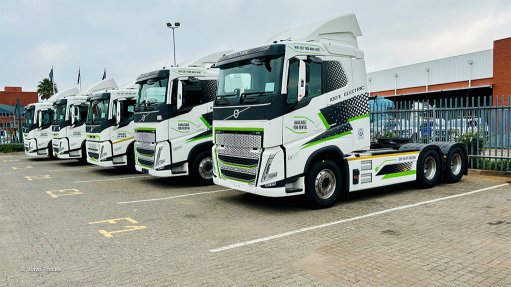Smart, self-managing lighting the future for municipalities
The time of humans controlling light fixtures is fading rapidly, says luminaires manufacturer BEKA Schréder product development manager Daniel Kasper.
“The luminaire will control itself; it will react and adjust by itself to the conditions around it. Soon there will be no need for light switches.”
Think, for example, of parking basements in places such as Melrose Arch where the lights come on as it senses the movement of a nearing pedestrian or vehicle.
“There are a few smart installations in South Africa, but not many,” adds BEKA Schréder marketing manager Grant Combrink.
Kasper says smart lighting will form an integral part of the Internet of Things (IoT) as this phenomenon continues its global roll-out.
IoT refers to the network of physical devices, such as vehicles, homes, appliances and lighting, embedded with electronics, software, sensors, actuators, and connectivity which enables these things to connect, collect and exchange data, and act in response to this data.
Imagine a load-shedding scenario in a connected system where the municipality can, if necessary, dim the streetlights to save power, but still retain the required level of safety, or, switch off street lamps, but keep the traffic lights operating to ensure motorists’ safety.
“The technology already exists for this to happen,” explains Combrink.
“Traffic lights can also, for example, tell municipalities that they require repairs. Streetlights can send a failure signal to municipalities. These signals can be received on handheld devices, such as mobile phones, ensuring ease of operation.
Systems like these will, however, take time to implement.”
One perceived hurdle is cost
“Smart lighting needs smart luminaires,” says Kasper. “If, however, municipalities cannot yet afford to acquire and connect all the required systems, it can install smart-ready luminaires that can be switched on when the funds are secured to roll out a smart system.
“Smart lighting is about more than energy saving, it is about monitoring and controlling to the benefit of all parties – which is why it isn’t really a price conversation,” he notes.
Combrink emphasises that smart systems require open communication networks, with all suppliers able to tap into the network. If one supplier, or the municipality, roll out a proprietary system this may wreak havoc on successful system integration.
“This is why the system we use is an open communication system.”
More than 70% of BEKA Schréder’s revenue flows from municipalities, with the company strongly focused on road and urban lighting.
Kasper says municipalities are increasingly switching over to light-emitting diodes (LEDs) for their streetlighting requirements.
“LEDs are more expensive than traditional lighting, but they last much longer and they use less energy.”
Kasper adds that LED technology continues to evolve rapidly, with a roughly 33% energy saving when a new LED light today replaces one installed five years ago.
40th Birthday
BEKA Schréder is a manufacturer of luminaires and glass fibre reinforced polyester (GRP) poles. The company, which originated in Nambia in 1978 and this year celebrates its 40th birthday, in 2013 became a wholly owned subsidiary of the Belgian Schréder group, a multinational lighting group that is present in about 35 countries.
Originally employing eight people, the company now employs more than 350 people.
The first products the company manufactured were corrosion-resistant GRP poles and public lighting luminaires, in response to the highly corrosive Namibian environment.
Comments
Press Office
Announcements
What's On
Subscribe to improve your user experience...
Option 1 (equivalent of R125 a month):
Receive a weekly copy of Creamer Media's Engineering News & Mining Weekly magazine
(print copy for those in South Africa and e-magazine for those outside of South Africa)
Receive daily email newsletters
Access to full search results
Access archive of magazine back copies
Access to Projects in Progress
Access to ONE Research Report of your choice in PDF format
Option 2 (equivalent of R375 a month):
All benefits from Option 1
PLUS
Access to Creamer Media's Research Channel Africa for ALL Research Reports, in PDF format, on various industrial and mining sectors
including Electricity; Water; Energy Transition; Hydrogen; Roads, Rail and Ports; Coal; Gold; Platinum; Battery Metals; etc.
Already a subscriber?
Forgotten your password?
Receive weekly copy of Creamer Media's Engineering News & Mining Weekly magazine (print copy for those in South Africa and e-magazine for those outside of South Africa)
➕
Recieve daily email newsletters
➕
Access to full search results
➕
Access archive of magazine back copies
➕
Access to Projects in Progress
➕
Access to ONE Research Report of your choice in PDF format
RESEARCH CHANNEL AFRICA
R4500 (equivalent of R375 a month)
SUBSCRIBEAll benefits from Option 1
➕
Access to Creamer Media's Research Channel Africa for ALL Research Reports on various industrial and mining sectors, in PDF format, including on:
Electricity
➕
Water
➕
Energy Transition
➕
Hydrogen
➕
Roads, Rail and Ports
➕
Coal
➕
Gold
➕
Platinum
➕
Battery Metals
➕
etc.
Receive all benefits from Option 1 or Option 2 delivered to numerous people at your company
➕
Multiple User names and Passwords for simultaneous log-ins
➕
Intranet integration access to all in your organisation


















